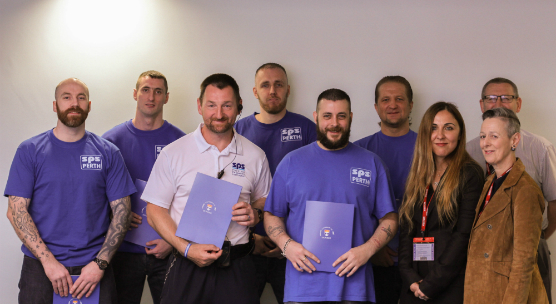Dundee dentists pilot public health coaching in prison
Published On Tue 13 Sep 2016 by Dominic Younger

A health coaching initiative developed by dentists from the University of Dundee has led to a significant shift in the behaviour and wellbeing of prisoners at HM Prison Perth.
The team from the Dental Health Services Research Unit (DHSRU) developed the People in Prison, Health Coaching for Scotland (PeP-SCOT)programme to provide health coaching training for people in prison.
PeP-SCOT was delivered in collaboration between the University of Dundee, the NHS Tayside’s Oral Health Improvement Team, Scottish Prison Services and the charity Positive Prison? Positive Futures (PPPF).
Prison Officers noted positive changes in the behaviour of those who took part in the programme, such as quitting smoking and other health improvements. They also noticed more reflective behaviour displayed by the participants following the coaching.
Professor Ruth Freeman, co-director of the DHSRU, said, “PeP-SCOT was a relatively small scale study but it had intriguing results. It all began with oral health but as we know from public health research when you start caring for your teeth, you start caring for your whole self.
“The pilot became about more than just about physical well-being. It enabled the participants to discover their own potential and rediscover their life skills.
“The PeP-SCOT programme aims to address the psycho-social issues which are associated with offending and by fostering social interactions, through peer-to-peer education, establishes an environment to permit empowerment and a different way of being.”
The programme, which consisted of over 92 hours of training, included group development and one-to-one weekly supervision with qualified coaches, Dr Ayse Cinar and Stephen Valentine, together with two training sessions delivered by NHS Tayside’s Oral Health Educators on the importance of oral hygiene.
All participants received health coaching certification and qualifications from the Royal Society of Public Health, accredited by the International Coaching Federation and many of those taking part in the training have said that when they are released they intend to use their new skills to assist others avoid potentially criminal lifestyle choices.
Pete White, Chief Executive of PPPF, said, “The benefits of the health coaching programme pioneered in HMP Perth will be life-changing for all the participants and the people with whom they share their newly gained skills and expertise.
“Given that the majority of people living in prisons in Scotland come from impoverished and marginalised backgrounds the positive lifestyle opportunities made possible thanks to the health coaches will have a massive and long-lasting impact.
“This should just be the beginning of health coaching becoming part of, not only prison life across Scotland, but also the lives of the wider communities to which the health coaches return.”
Alongside her work in HMP Perth, Professor Freeman has also recently collaborated on work examining potential alternatives to imprisonment which could help to address the psycho-social and economic causes of offending behaviours.
The two-year EU project, funded by DG Justice, was conducted by a number of researchers from across European universities and NGOs. The work suggests that investing in community sanctions and probation could pave the way for meaningful rehabilitation as opposed to reoffending and overpopulation in Europe’s prisons.
For media enquiries contact:
Dominic Glasgow
Media Relations Officer
University of Dundee
Nethergate, Dundee, DD1 4HN
Tel: +44 (0)1382 385131
Email: d.w.glasgow@dundee.ac.uk